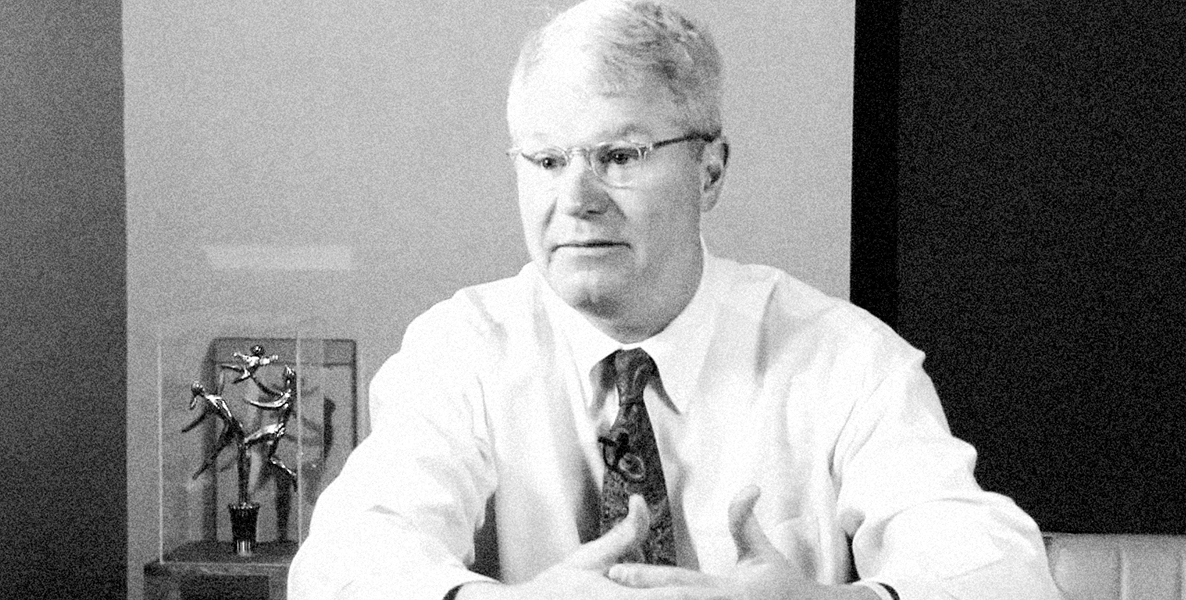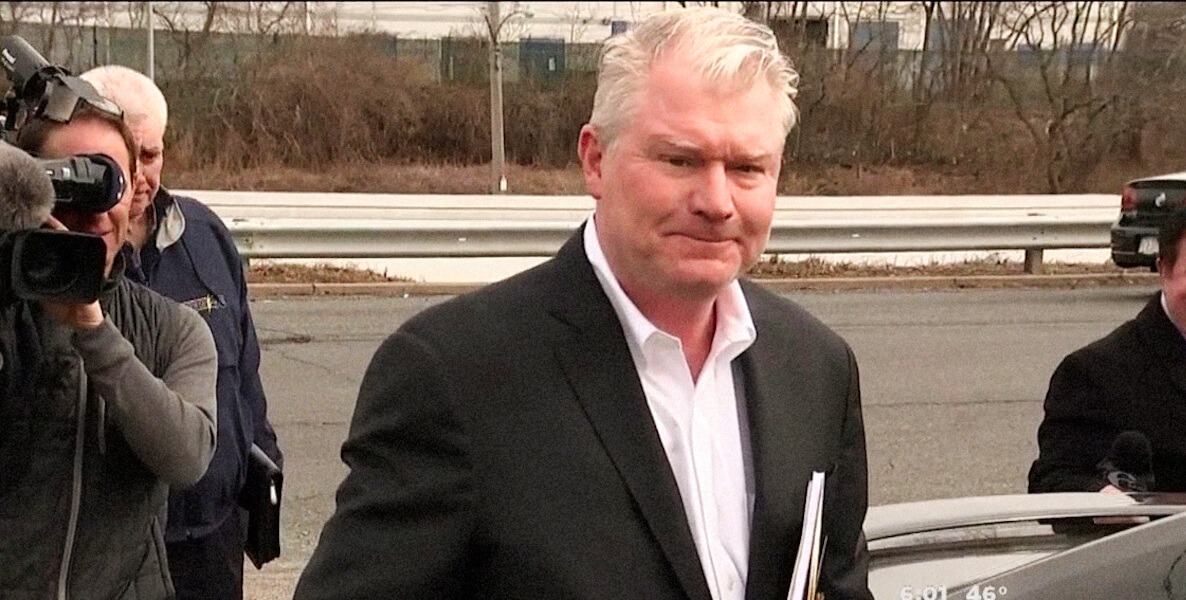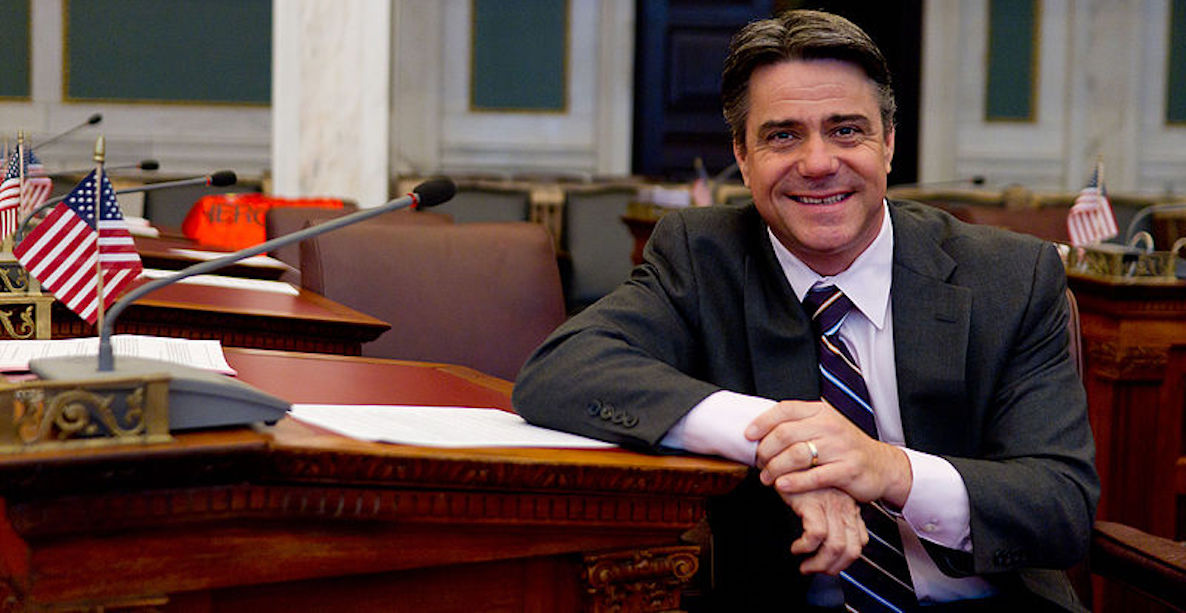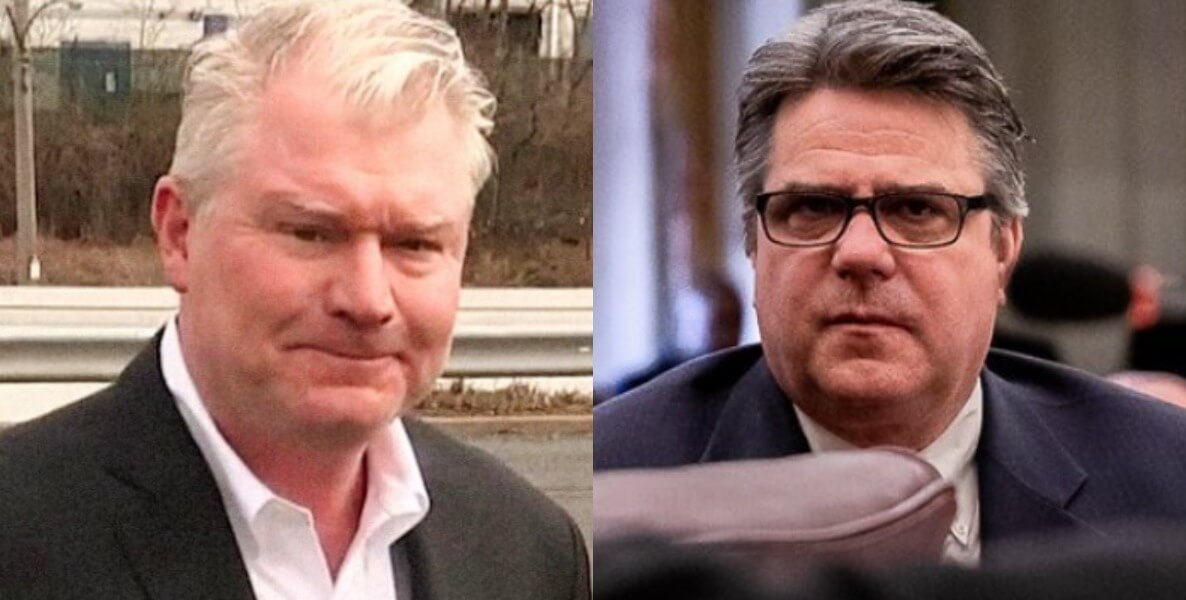About a year ago, I got a call from a friend l have in common with indicted labor leader John Dougherty. “You should talk to John,” he said. “He can’t understand why you’re always beating up on Jimmy. He thinks you must be working for Josh.”
Okay, so let’s translate. Jimmy, of course, is the mayor, Dougherty’s close political ally, with whom he grew up. And Josh is Attorney General Josh Shapiro. I immediately had two reactions. No, I didn’t want to talk to John, I said. I’ve always thought of him as a fun guy to talk Phillies baseball with, but whenever I’ve talked to him in the past about substantive matters—numerous times over the past 20 years—I’ve never been able to follow his train of thought.
For John Dougherty there is no such thing as a principled position. Everything is about pure power, its acquisition and deployment. It’s a terribly cynical—and ultimately anti-democratic—way to govern, which is what makes this trial so different from all the other public corruption trials we’ve endured of late.
As he will no doubt demonstrate if he takes the stand in the first of—count ‘em—three corruption trials now getting underway in federal court that finds him and City Councilmember Bobby Henon as defendants, Dougherty’s idiosyncratic speech pattern has long shed more heat than light. Even in casual conversation, he assumes you know context you’d have no way of knowing and the result is a word salad that leaves you more confused than before you engaged with him. I’ve never been able to discern if that’s just the way he talks—the synapses always firing—or if he’s a savant at obfuscation and misdirection. Either way, talking to him is an exercise in futility.
But the other part of the outreach—the preposterous notion that what I’d been writing was really me doing the bidding of the attorney general—has stuck with me to this day, and is illustrative of something we’ll no doubt see demonstrated in his trial, time and again.
RELATED: Philly corruption all-stars—the full list
For John Dougherty—and, by extension, many of his allies and acolytes—there is no such thing as a principled position. Everything is about pure power, its acquisition and deployment. It’s a terribly cynical—and ultimately anti-democratic—way to govern, which is what makes this trial so different from all the other public corruption trials we’ve endured of late—Fumo, Fattah, Williams, Kane, Johnson-Harrell, et al. This one will lay bare the tactics of a style of politics that—we’ll see—may be illegal, but is undoubtedly wholly undemocratic and counter to the public good.
“Johnny is the biggest conspiracy theorist I’ve known in politics,” says longtime political consultant Ken Smukler, himself no stranger to federal prosecution. “He’s a one-man QAnon conspiracy. It’s why so much of what will come out in the trial will seem so petty and vindictive.”
Before we get to examples of that short-sightedness and vindictiveness, a note: yes, what follows will include some reforms that ought to come out of this Dougherty/Henon mess. But, after talking to Smukler and a handful of other insiders lately, permit me a critical caveat: It just may be that we can’t better Philadelphia’s insidious, transactional political culture through regulatory reform. In the end, we may just need people of more elevated character to play the game.
None of this, mind you, is to pronounce on Dougherty’s or Henon’s guilt or innocence. That’s for the jury to decide. But any fair-minded consideration of how Dougherty and Henon have conducted political business for years can’t help but lead to the conclusion that—unlike other bad actors who have danced across our public stage—Dougherty truly has been expert at weaponizing the levers of government to meet his own needs. Maybe that’s not illegal—a recent Supreme Court ruling concerning the former governor of Virginia’s actions renders blurry what is an “official act” on the part of an elected official—but it is…just kinda gross.
In the 160-page indictment of Dougherty and Henon, and already in the trial’s testimony, we’re hearing some depressing stuff. What’s truly stunning, in addition to the Sopranos-like way these guys talk (Henon to Dougherty: “I don’t give a fuck about anybody, all right, but fucking you and us, and you know that.”), is the degree to which Dougherty is alleged to have masterminded the subversion of our very democracy. Henon, Dougherty’s former political director, gets paid $140,000 to be a Councilmember—to work for the taxpayer, in other words—but he remained on Dougherty’s payroll at a cool $73,000 per year.
RELATED: The Dougherty fallout—where’s the outrage?
Sadly, that’s not illegal, but is it any wonder, then, that Henon is seen throughout the indictment allegedly using his Council power to manipulate the wheels of government to serve Dougherty’s desires at our expense? At Dougherty’s instruction, the complaint alleges, Henon pressured Comcast to steer close to $2 million in electrical work to a Dougherty ally—work that was far pricier than other bidders—when Comcast was seeking Council approval of its 15-year cable lease with the city.
Worse, when he learned that Children’s Hospital of Philadelphia was having two MRI machines installed by non-union labor, Dougherty called a hospital official who told him that the manufacturer had to install the machines in order for the warranty to be valid. The union leader wasn’t having it. “It is also an L&I violation,” Dougherty said. “You don’t want a city thing shutting it down.”
Hmmm, sounds a lot like, Nice little business here, it would be a shame if something happened to it. Lo and behold, Henon not once but twice saw to it that L&I intervened in the case and issued stop-work orders. Think about that for a moment. A City Councilmember using the power of his office to get a city agency to put its thumb on the scale in a labor dispute.
Remember that controversial soda tax? Turns out, Doc and Henon were for it, the indictment alleges, not because it would fund pre-K or repair parks and rec centers. They wanted it in order to stick it to the Teamsters, which had run an ad in 2015 (!!) that hurt little Johnny’s feelings. In the indictment, Dougherty tells a union official colleague, “Let me tell you what Bobby Henon’s going to do, and he’s already talked to [elected local public official]…They’re going to start to put a tax on soda again, and that will cost the Teamsters 100 jobs in Philly.”
At a time when trust in our institutions might be at an all-time low, our courts, like our politics, ought to conduct its business in the light of day before as many citizens as humanly possible.
Hell, you can’t make this stuff up: Dougherty, enraged that a tow truck driver had been unable to give him $10 back in change, is alleged to have directed his lackey to hold a Council hearing to investigate the company. Mind you, not an investigation into the tow truck industry, which could be a legitimate act of Council as part of its oversight responsibilities, but a hearing into a specific company—all because some poor schmuck couldn’t provide exact change.
In opening statements, the defense has already previewed its argument in response: That the government has a vendetta against their client and is criminalizing the practice of politics. On the first point, there is at least some anecdotal support. The feds first raided Dougherty’s house five years ago—so much for speedy trials. And, seriously, three trials? (The current bribery trial; plus one that alleges some $600,000 in embezzled union funds, to be followed by facing charges for threatening a contractor who accused Dougherty’s nephew of assault.) What are the chances the Feds go 0 for 3?
RELATED: The union leader and Henon want you to believe they’re the victims
Throughout our history, the defense’s second argument goes, interested parties have contributed to political candidates in order to essentially get something for themselves. What Dougherty has done with Henon, their lawyers say, is simply the “normal and lawful lobbying of a City Councilmember.” This is where the power of specific anecdotes will carry the day in court. We’re used to political donors leveraging influence to shape legislation or garner favorable tax rates—but is that a far cry from a power broker hijacking the operations of government in order to punish his enemies and reward his friends?
If all the predicate facts in the indictment are true—and presumably the quotes in the indictment are directly from wiretaps that will air in court—it’s pretty hard to get around the disturbing inference that an unelected labor leader weaponized a City Councilmember and commandeered the work of city government for his own ends.
If that’s true, there should be full-throated condemnation from anyone and everyone in our public life. But, outside of Councilmember Maria Quinones-Sanchez and State Representative Jared Solomon, have you heard anything but crickets from our political class? Might that be because the long arm of Johnny Doc’s checkbook reached into so many pockets? Progressives, where’s your moral outrage now?
RELATED: Rep. Jared Solomon says enough to corruption, Philly
These next four-to-six weeks will be replete with concrete examples, culled from testimony and wiretaps, of the Dougherty and Henon playbook. There will be anecdote after anecdote in our daily news stories; the sum total could either fuel apathy or spark outrage. Here’s hoping for the latter, in a city well-schooled in the art of shrugging in response to governmental malfeasance. Either way, someone’s got to start thinking about how we seize this moment to make our politics better. To wit, a few reforms worth considering:
End the Outside Income Perk.
In Los Angeles, City Council members are paid more than anywhere else: in excess of $180,000 per year. But they at least have the good sense to also bar their council members from supplementing their income with outside pay.
Here in Philly, we have one of the nation’s highest-paid councils—an average of roughly $134,000 per year, plus perks like a city car—and yet no restrictions on outside income. That’s a pretty sweet deal for the council member, but not so much for the citizen.
That’s why Henon is able to legally pocket $73,000 a year from Dougherty. To be fair, Henon is not the only Councilmember who moonlights. In fact, many do. Councilmember Brian O’Neill is an attorney at a Center City law firm. Allan Domb has a real estate empire and owns numerous high-profile restaurants (though he donates his entire Council salary to the school district).
RELATED: The biggest Local 98 indictment scandal is totally legal
Years ago, I criticized then-Councilman Kenney for his six-figures in annual compensation from the Vitetta Corporation, an architectural firm that, at the time, did business with the City. He called me, irate; he recused himself from having anything to do with Vitetta’s city projects, he said, and, besides, he had bills to pay—I think he cited the cost of college tuition. He warned me to be careful about what I wished for: Do you really want a Council made up only of those who weren’t employable? “Get yourself a job in the private sector,” I told him. “City government will survive without you.”
By permitting outside income, we’ve created a class of local politicians with two masters—taxpayers and those who are putting them on the payroll. It’s a system that is inherently hostile to democracy.
Defang Councilmanic Prerogative.
Yes, the main reason Henon could get an entire city agency like L & I to do his patron’s bidding is that everyone knows that when Bobby talks, it’s really Dougherty speaking. And just about everyone in and around city government either fears incurring Dougherty’s hair trigger wrath or is addicted to pocketing his campaign contributions.
But you could chip away at other sources of Henon’s power, like the scourge of Councilmanic Prerogative, the gentleman’s agreement among council members that all will defer to each district colleague when it comes to land use and development. It’s a system that creates little fiefdoms, and heightens the opportunity for graft and bribery. Moreover, given that district council members have more power than members who are elected by the whole city, it is anti-democratic and anti-communitarian. It says: We’re really not all in this together.
But how do you reverse something that isn’t even written down? You can’t very well outlaw something that isn’t even a law. Well, you could do as Chicago Mayor Lori Lightfoot did on her first day, when she lessened the power of the Windy City’s “Aldermanic Prerogative” by signing an executive order that strengthened the city’s planning and zoning departments.
RELATED: Corruption is on the ballot… in Chicago
Or you could, as Philly 3.0’s Jon Geeting has argued here, remove from the Charter the prerequisite that a Council ordinance precede the selling of public land, which would go a long way toward knee-capping Councilmanic Prerogative.
Show The Trial!
Nothing would, Oz-like, reveal Dougherty more than allowing cameras into the courtroom so citizens can see and hear the testimony that reveals the horrifyingly transactional nature of our politics. Yes, we have an electorate that has long been numbed into apathy by a lengthy list of perp walks and a media narrative that fixates on what’s broken. But I suspect that even the most jaded of Philadelphians would be outraged hearing about Dougherty’s and Henon’s petty and mean machinations.
“I just saw the Carpenters and Teamsters commercial with you in it,” Henon texted Dougherty in 2015, we learned during Wednesday’s testimony. “I’m going to fuck them big time, just so you know. … I will be smart about it, but there will be consequences.”
Where do these guys meet up, Satriales? It’s like eavesdropping on Tony and Silvio. The more citizens who hear this, the more likely we are to move on from such old country politicking.
On Wednesday, I reached out to trial Judge Jeffrey Schmehl, an Obama appointee to the federal bench. It is critical, I wrote, for the citizens of Philadelphia to be able to see and hear firsthand the transactional nature of the politics we’re de facto co-signers of—whether said transactions are legal or illegal.
The more you immerse yourself in how Dougherty, Henon and so many others have done the public’s business, the more you come away thinking that we just need better people putting themselves before voters. And we need those who enable venality, pettiness, and a Trump-like, zero sum fixation on narrow self-interest to find their voice.
“Would you consider allowing live-streaming or some other form of broadcasting into your courtroom to deliver what transpires directly to citizens?” I asked. “The days of relying on newspaper accounts seem, sadly, no longer sufficient.”
Alas, the judge says his hands are mostly tied. “Due to Federal Rule of Criminal Procedure 53 and Local EDPA Rules, which would have to be changed by a vote of the Board of Judges, video and other photographers are not permitted inside the courtrooms,” Judge Schmehl responded. “So it appears that your request for live streaming is not permissible.”
Despite the civic value of getting the Dougherty/Henon proceedings in front of as many citizens as possible, it appears we’ve run up against some classically antiquated thinking. Rule 83.3 of the United States District Court for the Eastern District of Pennsylvania Local Rules of Civil Procedure holds that the prohibition on cameras in courtrooms is “calculated to insure that the solemnity of such proceedings is not jeopardized.”
If we learned anything about the efficacy of cameras in the courtroom, it was during the Minnesota state trial of Derek Chauvin, the police officer who murdered George Floyd. The public interest was surely served by millions of citizens seeing all those police officers (finally!) step up and testify against one of their own. The same principle applies here: At a time when trust in our institutions might be at an all-time low, our courts, like our politics, ought to conduct its business in the light of day before as many citizens as humanly possible.
All that said, again, I’m not sure there is a policy fix here, per se. The fact is, we bear our fair share of the blame for the sad state of our public discourse. We don’t vote and we don’t expect better of the representatives we end up getting. We practice the soft bigotry of low expectations and we get just what we deserve. Hell, even after he was indicted, Henon ran unopposed for reelection. It makes you want to quote ol’ Casey Stengel: Can’t anyone here play this game?
For those of us who do vote, who do care, the more you immerse yourself in how Dougherty, Henon and so many others have done the public’s business, whether what they do is legal or not, the more you come away thinking that we just need better people putting themselves before voters. And we need those who enable venality, pettiness, and a Trump-like, zero sum fixation on narrow self-interest to find their voice, even if that means not getting some big checks handed over to them.
It would be great if our labor and elected leaders were all straight outta The West Wing and exhibited gobs of wisdom and compassion. But, frankly, after hearing how Dougherty and Henon operate, I’d settle for leaders who, when it comes to their commitment to democratic values, signed onto a political version of the Hippocratic Oath: First, do no harm.
The Fix is made possible through a grant from the Thomas Skelton Harrison Foundation. The Harrison Foundation does not exercise editorial control or approval over the content of any material published by The Philadelphia Citizen.
Labor leader John Dougherty (L) and Councilmember Bobby Henon





